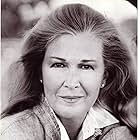Family members struggle to heal their emotional wounds after an incident of sexual abuse.Family members struggle to heal their emotional wounds after an incident of sexual abuse.Family members struggle to heal their emotional wounds after an incident of sexual abuse.
Joanne Robertson
- Elizabeth
- (as Joanne M. Robertson)
Mary Jo Cobb
- Restaurant Patron
- (uncredited)
Dale Ohnmeiss
- Businessman
- (uncredited)
Dawn Rendell
- High School Student
- (uncredited)
Jason Wozny
- Store Clerk
- (uncredited)
Storyline
Did you know
- TriviaThis film was the last movie role for Robert Urich, who died of cancer before its release.
Featured review
It is tempting to try not to criticize a film such as this, dealing with the issue of a father molesting his daughter - one of the most horrible things a man could do to his child. To add to this, if it weren't enough, it turns out the guilty father (Robert Urich) and the suffering mother (Meredith Baxter) were both victims of molestation as youngsters themselves.
However -- despite the subject matter, this is a bad movie. Urich and Baxter are attractive people, and their work in active careers has been credible if not remarkable. I do not see how, based upon the way this story was presented, anyone could feel an iota of sympathy for either. Urich died not long after the film's release, from cancer which he had battled for some time - and the whimpering, lethargic performance can probably be in part blamed upon the physical and emotional real-life problems he was encountering. Birney has played many roles of women riddled with angst, some due to persons menacing or otherwise mistreating her characters - and some where her character has been a raging sociopath. Her scenes with the therapist were weak - on the part of both characters - and did little to enlighten or portray a realistic therapeutic benefit to her in any way. Although Urich's "Jack" was already aware of his childhood tribulations, Meredith's "Carol" became aware of hers late in the presentation, as a result of the inevitable "dream," and then dialog with her widowed mother (Diane Ladd). Incidentally, the latter was a thoroughly selfish, unfeeling individual, and while apparently not physically abusive, would otherwise rate behind Joan Crawford in a Mother-of-the Year contest. And even the "revalations" gained from the therapist and mother were presented in a thoroughly unengaging manner.
The daughter, Tess, played by the attractive young Shawna Waldron, gave a decent performance, but one imagines it was less than it could have been, based upon the other characters/performances/story presentation. The scene towards the end where Ulrich is alone in the house with her (before Birney arrives, incensed about this), where he delivers a monologue with an attempt to gain some father/daughter rapprochement, is perhaps even weaker than the 1-3/4 hours which preceded it.
All-in-all, while the producers obviously felt they were providing a credible presentation of an important subject - they missed their mark by the proverbial "mile."
However -- despite the subject matter, this is a bad movie. Urich and Baxter are attractive people, and their work in active careers has been credible if not remarkable. I do not see how, based upon the way this story was presented, anyone could feel an iota of sympathy for either. Urich died not long after the film's release, from cancer which he had battled for some time - and the whimpering, lethargic performance can probably be in part blamed upon the physical and emotional real-life problems he was encountering. Birney has played many roles of women riddled with angst, some due to persons menacing or otherwise mistreating her characters - and some where her character has been a raging sociopath. Her scenes with the therapist were weak - on the part of both characters - and did little to enlighten or portray a realistic therapeutic benefit to her in any way. Although Urich's "Jack" was already aware of his childhood tribulations, Meredith's "Carol" became aware of hers late in the presentation, as a result of the inevitable "dream," and then dialog with her widowed mother (Diane Ladd). Incidentally, the latter was a thoroughly selfish, unfeeling individual, and while apparently not physically abusive, would otherwise rate behind Joan Crawford in a Mother-of-the Year contest. And even the "revalations" gained from the therapist and mother were presented in a thoroughly unengaging manner.
The daughter, Tess, played by the attractive young Shawna Waldron, gave a decent performance, but one imagines it was less than it could have been, based upon the other characters/performances/story presentation. The scene towards the end where Ulrich is alone in the house with her (before Birney arrives, incensed about this), where he delivers a monologue with an attempt to gain some father/daughter rapprochement, is perhaps even weaker than the 1-3/4 hours which preceded it.
All-in-all, while the producers obviously felt they were providing a credible presentation of an important subject - they missed their mark by the proverbial "mile."
Details
Contribute to this page
Suggest an edit or add missing content
























